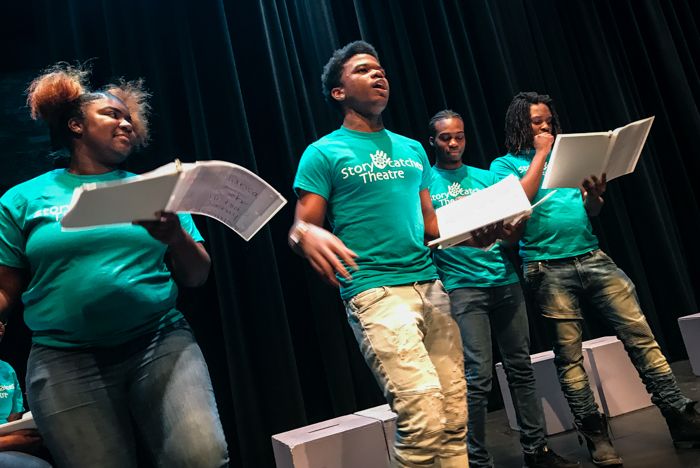As part of officer training for new recruits at the Chicago Police Department, cadets might find themselves roleplaying an arrest or a search. But at CPD since 2017, those cadets might be playing the role of a suspect, reading from a script written by youth who have experienced the criminal justice system themselves.
“You see the recruits playing out the parts. You can see they feel some kind of way when they’re told by the police sit on the curb or get down on your knees or things like that,” says Tim Crawford, an officer with the city’s Restorative Justice unit. “That can be a little, wow, I don’t like the way that feels.”
The youth who write the scripts are part of a nonprofit organization called Storycatchers Theatre, which helps young people use storytelling and musical theater to tell their stories of trauma and produce personal and social change.
Last year, Storycatchers held roleplaying workshops with more than 1,200 CPD recruits. A spokesperson for the department said that every recruit since the program started in 2017 has participated, including dozens of classes brought in during a hiring surge.
“Storycatchers has been a great tool for allowing recruits to see things from a different light,” Crawford says. At the same time, by having cadets read from scripts of the youths’ experiences, the young people are able to see their stories played out without having to participate directly. “Some of [the youth] were admittedly nervous initially,” Crawford says. Yet he says that allowing cadets and youth to meet each other in a controlled environment creates an opportunity for learning and empathy.
The Chicago Police Department is subject to a consent decree aimed at reforming the department after an investigation found constitutional abuses. The department has made headlines in recent years for torture and the murder of Lacquan McDonald. Working with the Storycatchers is one step towards transforming the department’s culture.
Meade Palidofsky founded Storycatchers in 1984. 35 years after it began, the program not only helps youth process trauma, by working with CPD it is working to transform the roots of that trauma.
Princess, who did not want her last name used, joined Storycatchers when she was in high school. “Although I was doing somewhat good [in school] — I had honors — I felt like it wasn’t enough for me,” she says. “I didn’t feel welcomed when I came into the school. I just kinda felt depressed. I kinda fell back, so that made me fall back behind,” she says. Princess carried two traumatic experiences with her: the shooting death of her brother, which she witnessed, and seeing someone overdose and die. She was 15 when her brother was killed.
The National Child Traumatic Stress Network has found that up to 90 percent of justice-involved youth have experienced at least one traumatic event. Realities like this combined with the stark economic inequalities facing Chicago neighborhoods keep Storycatchers’ executive director Priya Shah realistic about the impact Storycatchers can have. “If you’re thinking about a systems change, or if you’re thinking about changing the trajectory of a young person whose life has been disinvested for 18 years, it’s going to take time,” she says.
Still, Princess says that Storycatchers helps make experiences “useful instead of just keeping it in our heads and not doing anything with our [stories].” The Storycatchers staff, she says, supported her with her writing process and understood the issues she was writing about.
“When I felt everything was just falling down on me, I wrote,” Princess says.
This writing can have a therapeutic effect, says Christianne Strang, president of the American Art Therapy Association. Strang says that while Storycatchers doesn’t offer clinical art therapy, the organization is doing therapeutic work. “They are doing incredibly powerful work with allowing people to tell their story and then to transform it,” Strang says.
“The idea with a trauma-informed practice, and using art for trauma, is that the art can be a container,” Strang says. “It can help people not get flooded, not get overwhelmed so there can be some distance.” Tackling trauma through art can help people “titrate their responses and come to that in a place of safety so people can move through the trauma.” Getting to this point, Strang says, helps people recognize that the traumatic experience has ended.
While Storycatchers focuses on healing trauma, it also recognizes the importance of economic stability. As a result, the organization also employs a number of youth 30 hours a week. Last year, the organization employed 72 young people and worked with 156 youth in juvenile facilities.
Princess says she has two jobs right now: a summer job with Storycatchers and homecare for the elderly.
“I’m working for my mother. She had a traumatic brain injury,” Princess says. “I do what I have to do to take care of her.”
Shah sees Princess and her peers with optimism. “They are the most resilient young people I have ever seen,” she says. “They find strength in their vulnerability, and they are changing the world with their voices,” Shah says. “If they just get an equitable platform, they can achieve so many successes, and we see it on a daily basis.”
As for Princess, she graduated with a 3.6 GPA on June 14 — on time. She says that graduating feels good. “I feel accomplished.”

Zoe Sullivan is a multimedia journalist and visual artist with experience on the U.S. Gulf Coast, Argentina, Brazil, and Kenya. Her radio work has appeared on outlets such as BBC, Marketplace, Radio France International, Free Speech Radio News and DW. Her writing has appeared on outlets such as The Guardian, Al Jazeera America and The Crisis.
Follow Zoe .(JavaScript must be enabled to view this email address)















